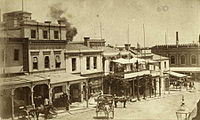The Argus (Melbourne)



The Argus was an Australian daily morning newspaper in Melbourne from 2 June 1846 to 19 January 1957, and was considered to be the general Australian newspaper of record for this period.[1] Widely known as a conservative newspaper for most of its history, it adopted a left-leaning approach from 1949. The Argus's main competitor was David Syme's more liberal-minded newspaper, The Age.
History[edit]
The newspaper was originally owned by William Kerr, who was also Melbourne's town clerk from 1851 to 1856 and had been a journalist at the Sydney Gazette before moving to Melbourne in 1839 to work on John Fawkner's newspaper, the Port Phillip Patriot.
The first edition was published on 2 June 1846. The paper soon became known for its scurrilous abuse and sarcasm, and by 1853, after he had lost a series of libel lawsuits, Kerr was forced to sell the paper's ownership to avoid financial ruin. The paper was then published by Edward Wilson.[2] By 1855, it had a daily circulation of 13,000.[3]
In October 1881, an afternoon edition was launched, the Evening Mail, edited by Henry Short, but this was a failure, and ceased publication in August 1882.[4] In 1883, newspaper editor and owner Richard Twopeny (1857–1919) regarded The Argus as "the best daily paper published out of England".[5] The paper become a stablemate to the weekly The Australasian, which became the Australasian Post in 1946.
During the Depression, in 1933, it launched the Melbourne Evening Star in competition with The Herald newspaper of the Herald & Weekly Times, but ended the venture in 1936 due to poor circulation figures.
The company's newspaper operations experienced severe financial losses from 1939 onwards, which would continue through the 1940s and the 1950s due to economic turmoil, increased costs of newsprint, and cut-throat competition for newspaper circulation in Melbourne.
In June 1949, The Argus was acquired by the London based Daily Mirror newspaper group and, on 28 July 1952, it became the first newspaper in the world to publish colour photographs in a daily paper. The paper also had interests in radio and, from 1956, the new medium of television, being part of the consortium General Telecasters Victoria (GTV) and its television station GTV-9 (now part of the Nine Network).
On 19 January 1957, after 110 years, seven months and 17 days, the final edition of The Argus was published. The paper was discontinued and sold to the Herald and Weekly Times group (HWT), which undertook to re-employ Argus staff and continue publication of selected features,[6] and also made an allocation of shares to the UK owners. The company's other print and broadcasting operations were unaffected.[7]
Notable editors and writers[edit]
- Julian Howard Ashton (1877–1964), English-born journalist, writer and critic
- Hugh Buggy (1896–1974), journalist/football writer
- Edward S. Cunningham (1859–1957), editor 1906–1928
- Roy Curthoys (1892–1971), editor 1929–1935
- Frances Fitzgerald Elmes (1867–1919), English-born feminist journalist
- Frederick William Haddon, (1839–1906), English-Australian sub-editor in 1863, editor 1867–1898
- Andrew Murray, editor in 1855 and 1856
- Charles Patrick Smith (1877–1963), journalist
- Edward Oxford (1822–1900), writer and attempted assassin of Queen Victoria.
- James Smith
- David Watterston
- Howard Willoughby
- Edward Wilson
- Theodosia Ada Wallace, starting about 1892 she wrote a social column under the name 'Biddy B.A.'
- Arnold Shore, art critic
- Frank Doherty, theatre critic
- George Johnston, Australian journalist, war correspondent and novelist, best known for My Brother Jack.
- Charmian Clift (30 August 1923 – 8 July 1969), Australian journalist and writer. Literary collaborator of husband George Johnston.
See also[edit]
- List of newspapers in Australia
- Argus Building
- Argus finals system, a series of systems for determining the premiers of the Victorian Football League and other Australian rules football competitions in the early 20th century
- Australasian Sketcher with Pen and Pencil
Further reading[edit]
- Don Hauser: The Printers of the Streets and Lanes of Melbourne (1837–1975), Nondescript Press, Melbourne 2006, ISBN 978-0-975-84240-9.
- Jim Usher (ed): The Argus – life and death of a newspaper, Australian Scholarly Publishing, Melbourne, 2008, ISBN 1-74097-143-4.
References[edit]
- ^ Hirst, John; Suter, Geraldine, eds. (2012). "Index to the Melbourne Argus newspaper (for the period 1870–1889)". La Trobe University. Retrieved 20 March 2015.
- ^ Three original proprietors The Argus, 9 September 1926, at Trove
- ^ Selby, Isaac (1924). The Old Pioneers' Memorial History of Melbourne (First ed.). Melbourne: The Old Pioneers’ Memorial Fund. p. 192.
- ^ "Epitaph". The Age. No. 8589. Victoria, Australia. 26 August 1882. p. 4. Retrieved 28 December 2021 – via National Library of Australia.
- ^ R. E. N. Twopeny, Town life in Australia, London, Eliot Stock, 1883, p. 222.
- ^ Message to Argus readers from The Sun News-Pictorial The Argus, final edition, 19 January 1957 at Trove
- ^ Your Last Argus The Argus, 19 January 1957, at Trove
External links[edit]
- The Melbourne Argus (Vic. : 1846 – 1848) at Trove
- The Argus (Melbourne, Vic. : 1848 – 1957) at Trove
- The Argus: Special War Edition – 1 May 1915
- Digitised World War I Victorian newspapers from the State Library of Victoria
